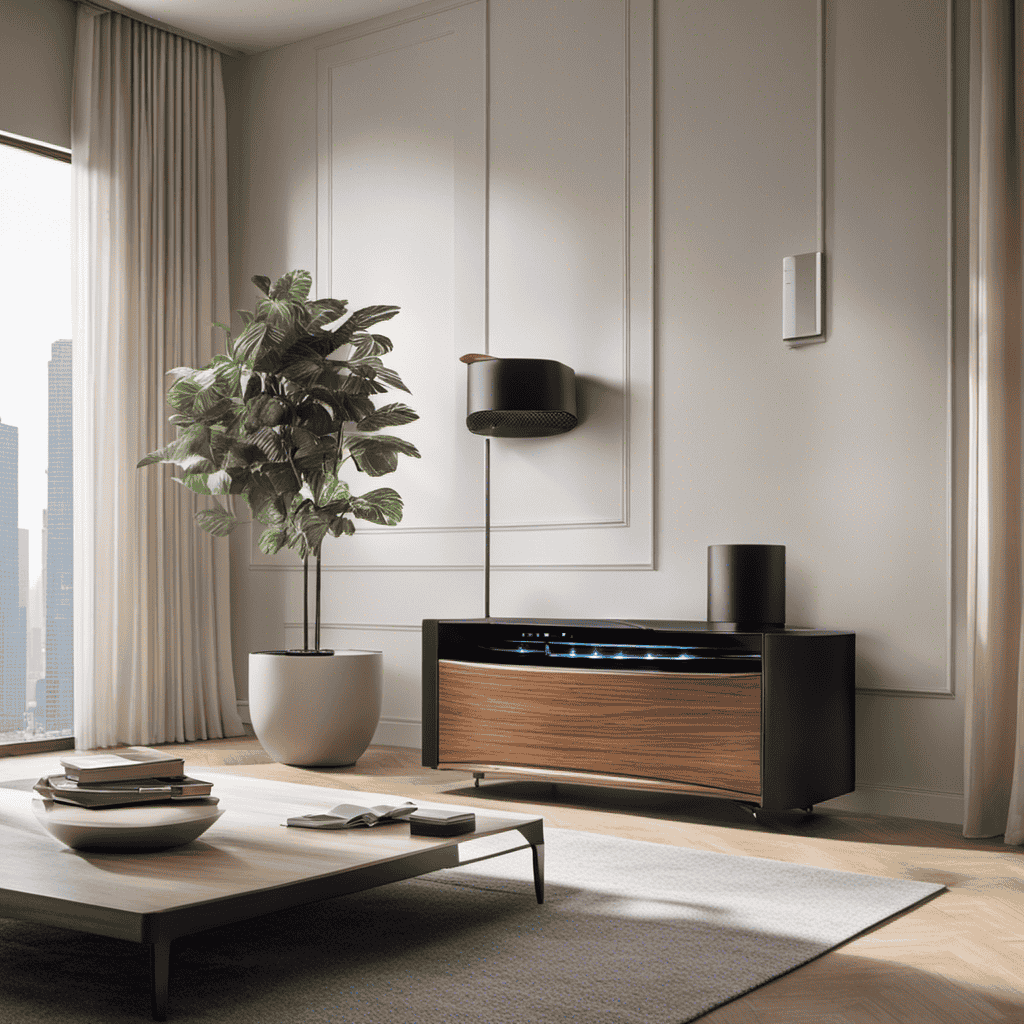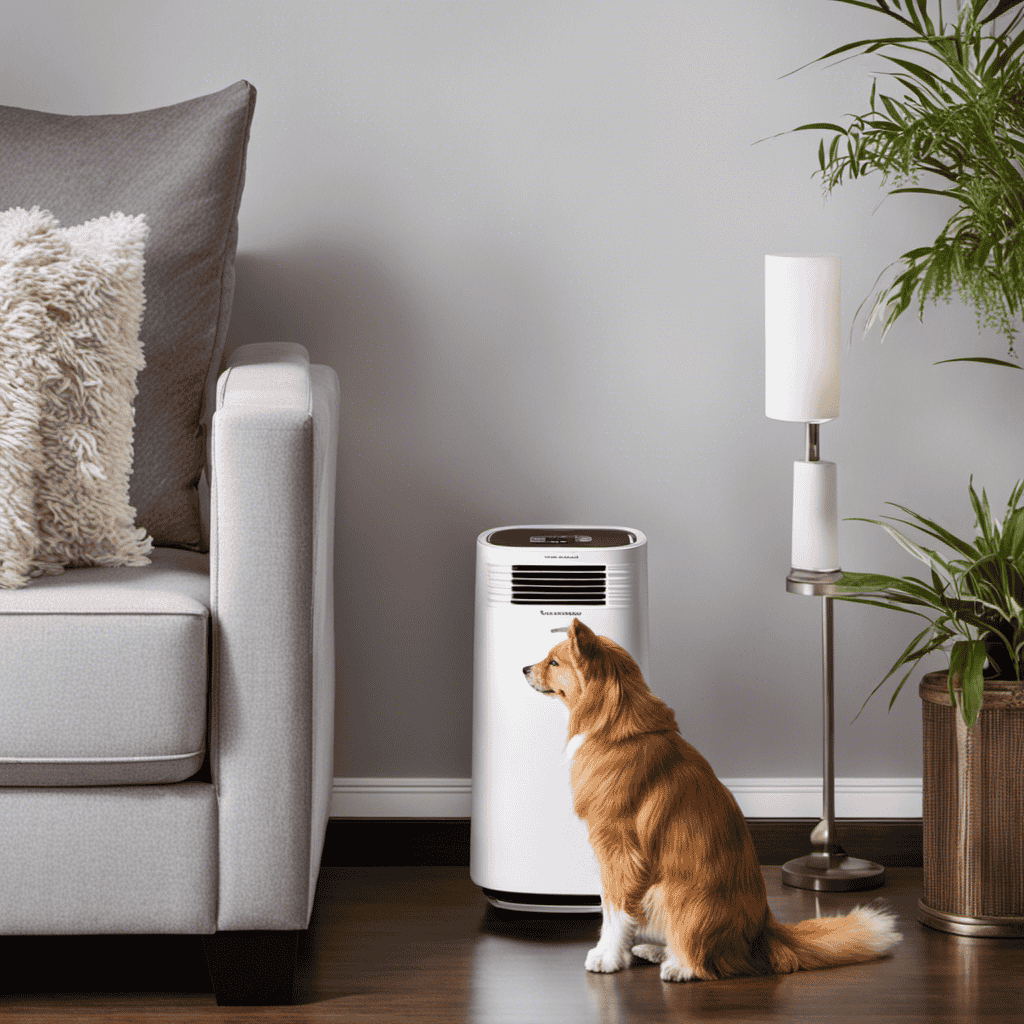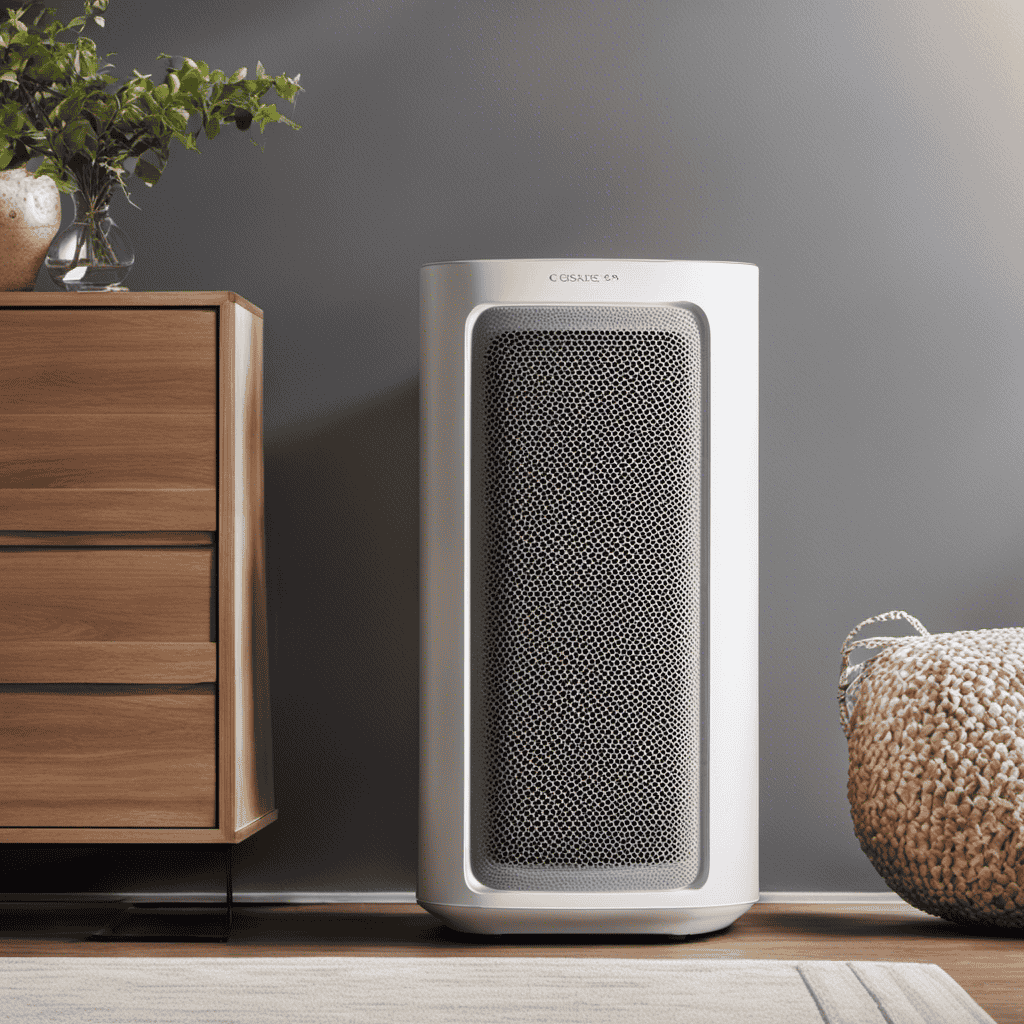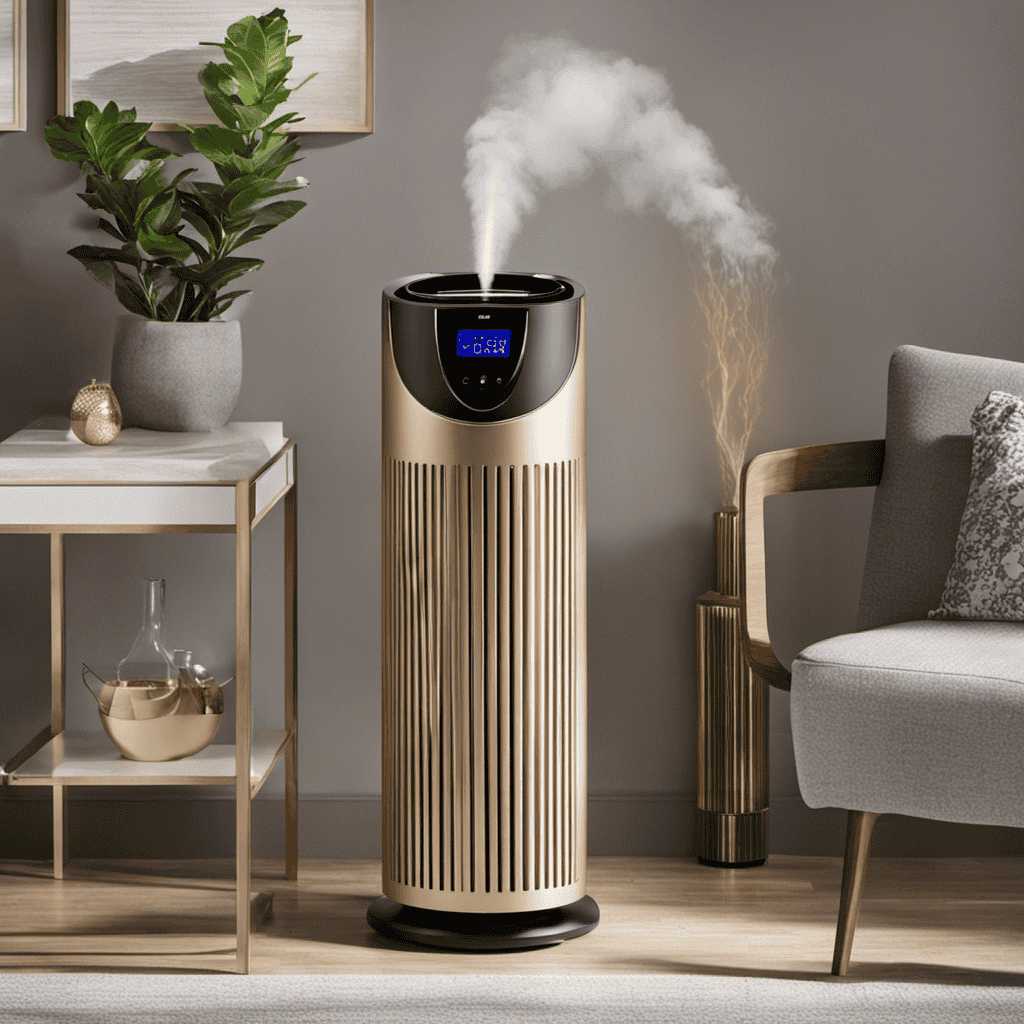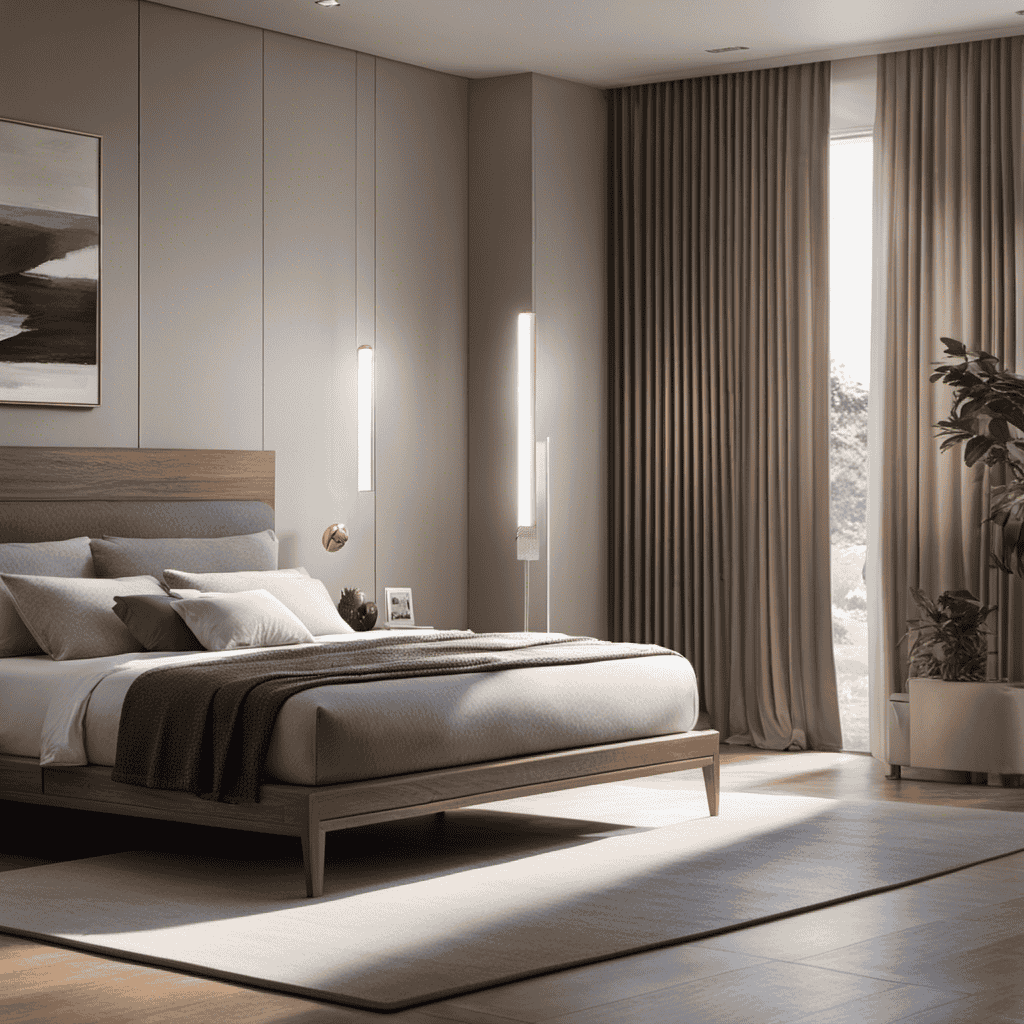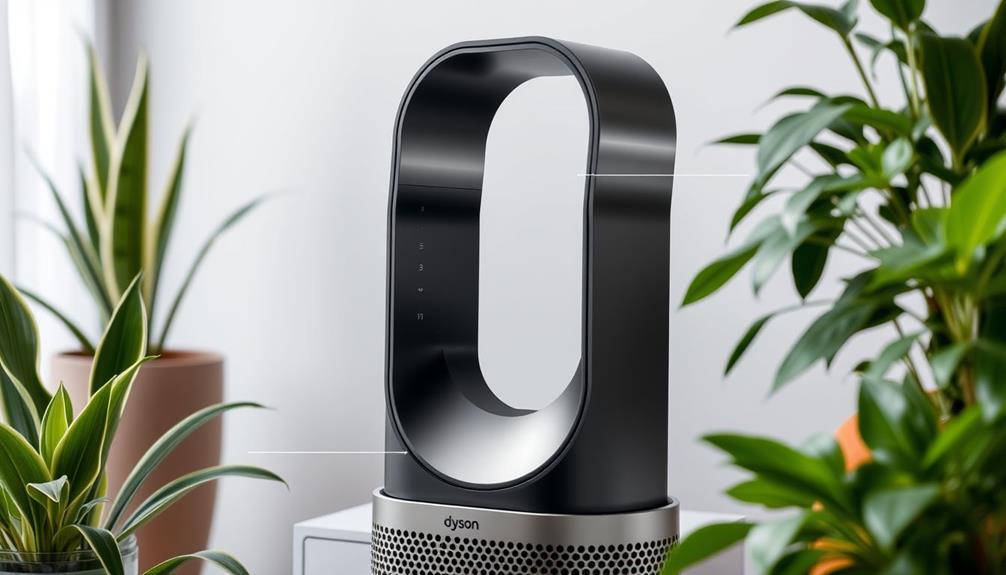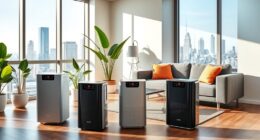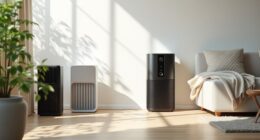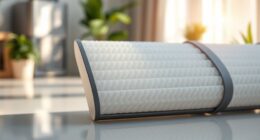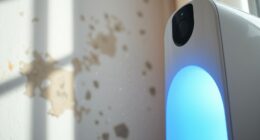As a fan of air purification, I’ve always been curious about the speed at which air purifier motors operate. It’s like the engine of the device, driving the filtration system that maintains our indoor air quality.
In this article, we’ll dive into the factors that affect motor speed, explore different speed ratings in air purifiers, and understand the crucial role motor speed plays in overall purification efficiency.
So, let’s embark on this scientific journey to unravel the mysteries of air purifier motors and find out just how fast they can go.
Key Takeaways
- Motor speed control mechanism allows users to adjust speed
- Motor speed variability allows for customization in different room sizes
- Motor speed testing determines maximum speed for effective purification
- Higher motor speeds result in better air purification
Factors Affecting the Speed of Air Purifier Motors
You’ll be interested to know that there are various factors that can affect the speed of air purifier motors.
One of the key factors is motor speed control. Air purifier motors are equipped with speed control mechanisms that allow users to adjust the motor speed according to their preference. This control mechanism can be in the form of a dial or buttons, enabling users to increase or decrease the speed of the motor.
Another factor that affects motor speed is motor speed variability. Some air purifier models offer multiple speed settings, providing users with the flexibility to choose the desired airflow intensity. This variability in motor speed allows for customization and ensures that the air purifier can effectively clean the air in different room sizes or conditions.
Overall, these factors contribute to the efficient and optimal functioning of air purifier motors.
Understanding Motor Speed Ratings in Air Purifiers
Understanding the motor speed ratings in air purifiers can help determine their efficiency. The motor speed control is an important feature in air purifiers as it directly affects how quickly the air is filtered and purified. Here are three key points to understand about motor speed ratings in air purifiers:
-
Motor speed testing: Manufacturers conduct motor speed testing to determine the maximum speed at which the motor can operate. This testing ensures that the motor can handle the workload required for effective air purification.
-
Efficiency: The motor speed rating indicates how efficiently the air purifier can filter and circulate the air in a given space. Higher motor speeds generally result in faster air purification.
-
Adjustability: Some air purifiers offer motor speed control, allowing users to adjust the speed based on their specific needs. This feature can be useful for controlling noise levels or adjusting the purification rate.
Understanding motor speed ratings in air purifiers is essential for choosing the right model that meets your specific requirements.
Now let’s explore the common motor speeds in different air purifier models.
Common Motor Speeds in Different Air Purifier Models
To determine the right air purifier model for you, consider the different motor speeds available in various models. Motor speed is a crucial factor affecting motor performance and overall air purification efficiency. The motor speed directly influences the filtration efficiency of an air purifier. Higher motor speeds typically result in better air purification as they can draw more air through the purifier, allowing for more effective filtration. However, it is important to note that higher motor speeds may also lead to increased noise levels and energy consumption.
On the other hand, lower motor speeds may be quieter and consume less energy, but they might not provide the same level of air purification. Finding the right balance between motor speed and filtration efficiency is key to choosing the most suitable air purifier for your needs.
Understanding the role of motor speed in air purification efficiency will further help in making an informed decision.
[Transition to the subsequent section: Now, let’s delve into the importance of motor speed in air purification efficiency.]The Role of Motor Speed in Air Purification Efficiency
In this discussion, I will be exploring the role of motor speed in air purification efficiency.
Optimal motor speed plays a crucial role in determining how effectively an air purifier can filter and clean the air in a given space.
Motor speed also affects the overall speed at which an air purifier can cycle and clean the air, which is an important factor to consider when choosing an air purifier for specific needs.
Lastly, we will also explore the impact of motor speed on the noise level generated by an air purifier, as this can be a significant consideration for those who value a quiet environment.
Optimal Motor Speed
You’ll want to know what the optimal speed is for air purifier motors. Motor speed control plays a crucial role in the performance and energy consumption of air purifiers. Finding the right balance is essential to maximize the purification efficiency while minimizing energy usage.
Here are three key factors to consider when determining the optimal motor speed for air purifiers:
-
Filtration efficiency: Higher motor speeds can increase the airflow rate, allowing for faster and more effective removal of pollutants from the air.
-
Noise level: Running the motor at excessively high speeds can result in increased noise, which may be undesirable in certain environments.
-
Energy consumption: Finding the optimal motor speed can help minimize energy usage and reduce operating costs without compromising the air purifier’s performance.
Efficiency and Speed
Finding the right balance between filtration efficiency and noise level is crucial when adjusting the motor speed of an air purifier. The motor power directly affects the speed at which the air purifier operates. It is important to consider the impact this has on both the filtration efficiency and the noise level.
Increasing the motor power can improve the filtration efficiency by allowing the air purifier to cycle more air in a given amount of time. However, a higher motor power can also increase the noise level of the air purifier, which may be undesirable in certain environments.
Additionally, it is important to consider the impact of motor speed on the lifespan of the motor itself. Running the motor at higher speeds for extended periods of time may lead to increased wear and reduced lifespan.
Transitioning into the next section, the noise level impact, it is essential to find a balance that maximizes filtration efficiency while minimizing noise level.
Noise Level Impact
Consider adjusting the motor speed to find a balance that reduces the noise level of your air purifier. The sound level measurement of an air purifier depends on various factors, one of which is the motor speed control. By optimizing the motor speed, you can achieve a quieter operation without compromising the air purification efficiency.
Here are three key points to keep in mind when adjusting the motor speed:
-
Start with the manufacturer’s recommendations: Review the user manual or contact the manufacturer to understand the recommended motor speed settings for your specific air purifier model.
-
Experiment with different speed settings: Gradually increase or decrease the motor speed and observe the impact on the noise level. Find the sweet spot where the noise reduction is significant while maintaining effective air purification.
-
Consider noise reduction techniques: In addition to adjusting the motor speed, you can also try incorporating sound dampening materials, such as foam or rubber, to further reduce noise generated by the air purifier’s components.
How to Determine the Optimal Motor Speed for Your Air Purifier
To determine the optimal motor speed for your air purifier, it’s important to understand how fast the motors typically run. Motor speed optimization and control play a crucial role in ensuring efficient air purification. The speed at which the motor operates affects the airflow and the purification effectiveness of the device. Different air purifiers may have different motor speed ranges, but typically, the motors run at speeds ranging from 500 to 2000 revolutions per minute (RPM).
To give you a better idea, here is a table showcasing the motor speed ranges for different types of air purifiers:
| Air Purifier Type | Minimum Speed (RPM) | Maximum Speed (RPM) |
|---|---|---|
| Portable | 500 | 1000 |
| Tower | 800 | 1500 |
| Whole House | 1000 | 2000 |
| HEPA | 600 | 1200 |
The Relationship Between Airflow Rate and Motor Speed in Air Purifiers
Understanding the relationship between airflow rate and motor speed in air purifiers can help you optimize the performance of your device. The motor speed directly affects the airflow rate, which plays a crucial role in the filtration efficiency of the air purifier.
Here are three key factors that influence motor speed and the importance of motor speed in air filtration:
-
Motor Power: The power of the motor determines how fast it can rotate the fan blades, which in turn affects the airflow rate. A more powerful motor can generate higher airflow rates, resulting in better air purification.
-
Fan Design: The design of the fan blades and the housing can impact the motor speed. Efficient fan designs can maximize airflow and minimize resistance, allowing the motor to operate at higher speeds and achieve higher airflow rates.
-
Filter Efficiency: Motor speed is essential for maintaining optimal filter efficiency. Higher motor speeds ensure that the air passes through the filters at a sufficient rate, allowing them to effectively capture pollutants and allergens.
Understanding these factors and the importance of motor speed in air filtration will help you choose an air purifier that meets your specific needs and optimize its performance for cleaner and healthier air.
Comparing Motor Speeds in Different Air Purifier Brands and Models
When comparing motor speeds in different air purifier brands and models, it is important to consider the impact of motor speed on the overall performance and effectiveness of the device. The speed at which the motor operates can directly affect the airflow rate and the ability of the air purifier to filter and clean the air in a given space.
Additionally, brand and model differences can play a significant role in determining the efficiency of the air purifier and its ability to maintain optimal air quality.
Motor Speed Impact
You might be wondering how the motor speed of an air purifier impacts its performance. Well, let me explain.
The motor speed control and regulation in an air purifier play a crucial role in determining its effectiveness. Here are three ways in which motor speed impacts the performance of an air purifier:
-
Enhanced Air Circulation: A higher motor speed allows for increased air circulation, ensuring that more air is processed and filtered in a shorter period of time. This results in improved air quality and faster purification.
-
Efficient Filtration: By adjusting the motor speed, the air purifier can optimize the filtration process. Higher speeds can help capture smaller particles, such as allergens and pollutants, more effectively, leading to cleaner air.
-
Noise Reduction: Motor speed regulation can also help in reducing noise levels. By controlling the motor speed, manufacturers can design air purifiers that operate quietly, providing a peaceful environment while still delivering excellent performance.
Brand and Model Differences
Different brands and models of air purifiers vary in terms of their motor speeds and how they impact performance. When considering a brand comparison, it is important to assess the motor power consumption as it directly affects the air purification rate and energy efficiency. To illustrate this, let’s compare the motor speeds and power consumption of three popular air purifier brands: Brand A, Brand B, and Brand C.
| Brand | Motor Speed (RPM) | Power Consumption (Watts) |
|---|---|---|
| A | 1000 | 50 |
| B | 1200 | 60 |
| C | 1500 | 70 |
As shown in the table, Brand C has the highest motor speed and power consumption, indicating that it may have a higher air purification rate. On the other hand, Brand A has the lowest motor speed and power consumption, suggesting a slower but potentially more energy-efficient performance. It is essential to consider both motor speed and power consumption when comparing different air purifier brands to choose the one that best suits your needs.
Efficiency and Air Quality
In my research on air purifiers, I have found that the performance of the motor plays a crucial role in the efficiency of the device. The motor speed directly affects the air purifier’s ability to process and filter air effectively.
Here are three important factors to consider regarding air purifier motor performance:
-
Motor Speed: A higher motor speed allows the air purifier to circulate more air in a shorter amount of time. This means that more particles and pollutants can be captured and filtered, resulting in improved air quality.
-
Energy Consumption: While a higher motor speed may be beneficial for air purification, it also leads to increased energy consumption. It’s important to find a balance between motor speed and energy efficiency to ensure optimal performance without excessive electricity usage.
-
Noise Level: Faster motor speeds often result in louder operation. If noise is a concern, it is advisable to choose an air purifier with a motor speed that strikes a balance between efficiency and quiet operation.
Considering these factors will help you select an air purifier with an optimal motor performance that meets your specific needs.
Frequently Asked Questions
Can Air Purifier Motors Be Adjusted to Different Speeds?
Yes, air purifier motors can be adjusted to different speeds. The speed of the motor directly affects the air purification efficiency. Higher speeds can provide faster purification, while lower speeds may be quieter but less effective.
How Does the Size of an Air Purifier Affect the Motor Speed?
The size of an air purifier can impact the motor speed, which in turn affects the efficiency of the air purifier. The motor speed is crucial for the effectiveness of the air purifier in providing clean air.
What Are the Advantages of Having a Higher Motor Speed in an Air Purifier?
Having a higher motor speed in an air purifier offers numerous benefits. It enhances the efficiency of air filtration, ensuring faster and more effective removal of pollutants. The increased airflow helps to improve indoor air quality, promoting a healthier living environment.
Are There Any Risks or Drawbacks to Running an Air Purifier Motor at High Speeds?
Running an air purifier motor at high speeds can pose risks of motor overheating, which may lead to reduced lifespan and potential damage. Additionally, the impact of motor speed on air purification efficiency should be carefully considered for optimal performance.
Do Air Purifiers With Higher Motor Speeds Consume More Energy Than Those With Lower Speeds?
Air purifiers with higher motor speeds consume more energy than those with lower speeds. This is because the faster the motor spins, the more power it requires to operate, resulting in increased energy consumption.
Conclusion
In conclusion, the speed of air purifier motors plays a crucial role in determining the efficiency of air purification. Factors such as motor speed ratings, airflow rate, and the specific model and brand of the air purifier all contribute to the overall performance.
It is important to understand these factors and choose the optimal motor speed for your air purifier to ensure the best air quality possible. Remember, as the saying goes, ‘Clean air is a breath of fresh life!’
